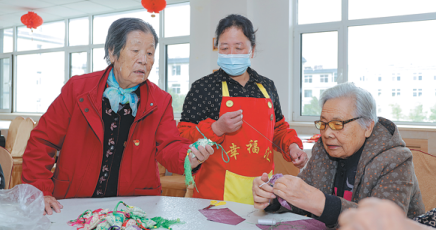Insurance plan enhances residents' social security
Updated: 2022-06-10

Residents make ornaments for Dragon Boat Festival at an elder care center in Taiyuan on June 3. [Photo by Si Ruirui for China Daily]
A resident surnamed Yan, in the Shanxi city of Lyuliang, began to be concerned with his life as an elder some 15 years away.
Yan, in his 40s, was proposed by civil affairs officials to join the local endowment insurance program.
He was informed that this is a government-sponsored program, with expenses covered by both the government and individuals.
"For my part, I need to pay 1,000 yuan ($150) a year," Yan said. "After paying for 15 years, I will be eligible to get more than 4,000 yuan a year since the age of 60."
The program that Yan wanted to join is a scheme supplementing the existing basic pension system that has covered many of the urban and rural areas of Shanxi.
"With the basic pension and the supplementary endowment insurance, I would be no longer worried about my future life as an old man," Yan said.
According to the Shanxi Department of Human Resources and Social Security, Shanxi's basic pension system has covered more than 21 million people in the province, or more than 95 percent of the people eligible for the system.
The pension system is only one aspect of Shanxi's social security undertakings, which also include the government-sponsored insurance programs for unemployment and workplace injuries, as well as a wide-coverage medical care insurance scheme.
The department's statistics show that Shanxi's medical care insurance has covered more than 32 million people, or more than 95 percent of its total population.
The Shanxi provincial government released 33 policy measures in 2021 to strengthen the social security system for residents, which include expanding the coverage of the system and requiring officials to improve their related services and streamline administrative procedures.
As a result, offering one-stop services relating to social security is now a common practice in Shanxi. Residents used to have their applications for such services handled at various government departments, and now these can be disposed of in one administrative service center in many cities and counties.
The province is now shifting its focus to offering assistance to senior citizens and disabled residents. In addition to increasing the amount of subsidies for them, many local governments have planned to increase investments in building more elderly and disabled care facilities.
Han Linfang contributed to this story.



